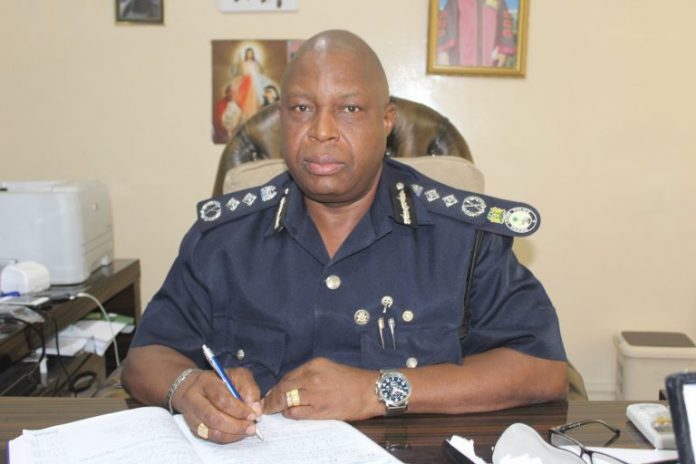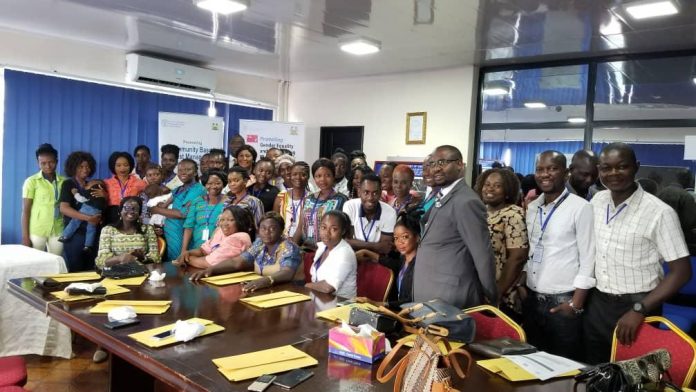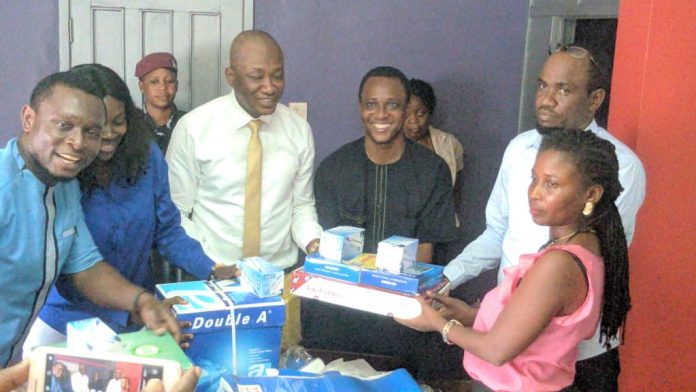The Food and Agriculture Organization (FAO) of the United Nations with the International Labor Organization (ILO), in collaboration with the Government of Sierra Leone with support from the Peace Building Fund (PBF), on Friday 14th June 2019 concluded a 3-days Training of Trainers (ToT) on Gender and Land Rights within the framework of implementing the PBF project on ‘Creating Peaceful Societies Through Women’s Improved Access to Management of Natural Resources, Land Tenure Rights and Economic Empowerment in Sierra Leone.’
The training brought together 33 women from four (4) districts of Bombali (North), Port Loko (North West), Bo (South) and Kenema (East) were the project is being implemented. The interactive Training of Trainers was held at FAO’s 38A Freetown Road Headquarters in Freetown. In her welcome statement and opening remarks, the FAO Representative in Sierra Leone, Dr. Nyabenyi Tito Tipo revealed that she was honored to be present at the training and pointed out that women being mothers should make change in their communities underscoring that the training would eip participants with the knowledge to advocate for land issues.
The FAO Representative emphasized that land is important for agriculture of which majority of farmers are women. She continued that all good things depend on land but unfortunately women continue to face challenges to acquire and manage land, the reason for the project and urged the women to speak with one voice to manage and use land as well as work as one firmly united collective force and train others reiterating that they would be changed agents at the end of the training.
According to Dr. Nyabenyi, the training would include topics on the National Land Policy and the Voluntary Guidelines on the Responsible Governance of Tenure of Land, Fisheries and Forests in the context of national food security (VGGT) and encouraged the women to actively participate in the discussions.
The ILO Country Manager, Mr. Paul Mayanja underscored the need for women to know their rights before being empowered, revealed that ILO would empower them to invest in land and strengthen their entrepreneurship and business skills. He observed that women are marginalized and emphasized that participants should replicate the training on land rights for women to make the right decisions.
Mr. Jobo Samba from the Ministry of Lands, Housing and Environment commended the Development Partners for their continued support to government, especially the Ministry of Lands, underlining that all developments are on land and informed that the National Land Policy which was developed in 2015 and launched in 2017 aims to address the numerous challenges relating to land and that implementation has commenced.
Mr. Jobo Samba went on to state that the results of the pilot project to protect customary land rights conducted in 2018 in selected chiefdoms was very good, and about 12,000 acres of land were surveyed and mapped within 6 months using FAO’s Solutions for Open Land Administration (SOLA) and Open Tenure software tools. Mr. Samba explained that 90% of land in the provinces is held under customary land tenure rules and practices and disclosed that this year, the Ministry of Lands wants to expand on the lessons learnt during the pilot phase of project in 2018 to additional 8 chiefdoms.
According to Mr. Samba, the training would empower the women how to access land and appealed to them to sensitize others in their respective communities stressing that they must take advantage of this opportunity.
Dr. Samuel Mabikke, the FAO, Land Tenure Officer enlightened that land governance is about rules, processes and structures through which decisions are made about access to land and its use and ways in which competing demands and conflicts are solved. He disclosed that Sierra Leone is an attractive destination for Large Scale Land Based Investments (LSLBI) but emphasized that these agricultural investments must serve the interest of the people especially the poor. He went further to explain challenges facing land governance including rapid population growth, unregulated urbanization, and climate change among others.
Dr. Mabikke cited that over 70% of Africa’s population lives in informal settlement while statistics show that only 6% of Americans live in informal settlements. In Sierra Leone,7 out of every 10 people live in slums due to rapid rural-urban migration especially among the youths. Rural areas have been depleted of young generations who would play a key role in transforming food and agriculture in Sierra Leone.
He emphasized the need for incorporation of a pro-poor and gender equality approach as cross-cutting principle of good governance in order for the rule of law, transparency, accountability, equity and justice to flourish and improve land management and administration solutions.
Highlighting the objectives and expected outcomes of the workshop, the Peace Building Fund Project Coordinator, Ibrahim Bangura said it would increase the knowledge and awareness of women on global and national principles, policies and practices such as the Voluntary Guidelines (VGGT), National Land Policy and existing legal frameworks for securing land and property rights.
He furthered that the workshop would also identify measures to support gender equity when working with customary institutions, describe how to develop institutional capacity for gender-equitable land tenure governance as well as enhance the skills of women to negotiate and advocate for gender equitable customary and statutory land laws.
Topics covered during the 3-days training include Background and Overview of the Peace Building Fund Project; Securing Women’s Customary Land Rights in the Context of Implementing the National Land Policy; Rights and Gender in Sierra Leone; Land Rights in the Constitution; Land Policy and Legal Framework; Land Governance, Tenure and Ownership Systems; Property Rights and Gender in Sierra Leone; Property Rights in Marriage and Family; the Role of Land Administration Institutions and Advocacy Responsibilities of a Community Land Rights Leader.
Other facilitators were Kadija Isata Jalloh, National Gender and Land Rights Trainer and Daniel Sesay of NAMATI.
Ms. Simonetta Rossi -the Peace and Development Advisor from the Office of the UN Resident Coordinator, revealed that the Office of the Resident Coordinator is pleased to be actively involved in the PBF project. She also observed that participants are from diverse backgrounds, that women should be recognized as agents of change to have access to land and how to manage their resources asserting that it is very encouraging that women are participating in the productive life of Sierra Leone.
Ms. Simonetta Rossi reechoed that women produce food and take care of children and hoped that more women leaders would emerge to take additional national decisions, stressed that the main aim of the project is Sustaining Peace and observing that land reforms are progressing gradually for which women should demonstrate leadership.
In his closing remarks, the Assistant FAO Representative for Programs, Mr. Joseph Brima commended participants pointing out that although majority of farmers are women they do not own land and recalled the past when land disputes were settled in secret society shrines.
He also stated that women have proved their strength and that women leaders are passionate about issues citing the Holy Bible where women played great roles and appealed to participants to serve as ambassadors of FAO, be proactive as well as replicate the training.
Highlights of the training were the presentation of certificates to participants, assessment of learning outcomes and end line evaluation survey while the vote of thanks was rendered by one of the participants, Adama Sesay, who promised on behalf of all that they would replicate the training in their respective communities.










